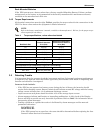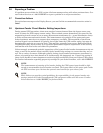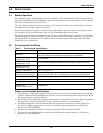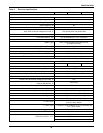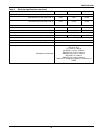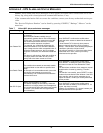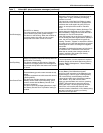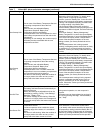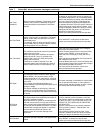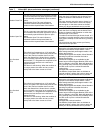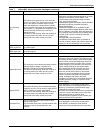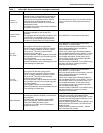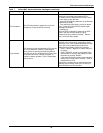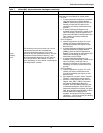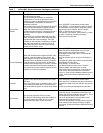
UPS Alarm and Status Messages
45
Batt Ovtemp Limit
One or more of the Battery Temperature Sensors
is reporting a temperature above the limit
setpoint.
There are two user-adjustable Battery
Temperature Setpoints: Battery Over
Temperature Warning and Battery
Overtemperature Limit. The temperature in one or
more battery compartments has risen above the
limit setpoint.
Depending on user settings, the controls may trip
the battery breaker associated with the over
temperature condition.
Press “SILENCE” to silence the audible alarm.
Observe the One-Line Display. To identify which
battery cabinet is reporting the temperature
condition, press the “Battery Box” on the One-Line
Display to cycle through each battery compartment
or string. The temperature display is located under
the voltage reading in the Battery Box.
If the Common Battery Disconnect and/or the
individual battery cabinet or string reporting the over
temperature condition is tripped, check the following
settings.
Press “User Settings,” “Battery Management,”
“Battery Temperature” to check the current Battery
Temperature Setpoints. If none of the Battery Boxes
on the One-Line Display exhibit a temperature in
excess of the temperature setpoint in the user
settings, contact your factory-authorized service
provider.
If the overtemperature limit is being reported
correctly, investigate potential causes such as faulty
air conditioning, or air flow blockage and resolve.
Otherwise, contact your factory-authorized service
provider.
Batt Ovtemp
Warning
One or more of the Battery Temperature Sensors
is reporting a temperature above the warning
setpoint.
There are two user adjustable Battery
Temperature Setpoints: Battery Over
Temperature Warning and Battery
Overtemperature Limit. This alarm means the
temperature in one or more battery compartments
has risen above the warning setpoint.
This alarm is self-clearing. When the condition is
no longer present, the alarm and any control
activity tied to the alarm reverts to normal
Press “SILENCE” to silence the audible alarm.
Observe the One-Line Display. To identify which
battery cabinet is reporting the temperature
condition, press the “Battery Box” on the One-Line
Display to cycle through each battery compartment
or string. The temperature display is located under
the voltage reading in the Battery Box.
Press “User Settings,” “Battery Management,”
“Battery Temperature” to check the current Battery
Temperature Setpoints. If none of the Battery Boxes
on the One-Line Display exhibit a temperature in
excess of the temperature setpoint in the user
settings, contact your factory-authorized service
provider.
If the overtemperature warning is being reported
correctly, investigate potential causes, such as
faulty air conditioning or air flow blockage and
resolve. Otherwise, contact your factory-authorized
service provider.
Batt Self Test
The UPS is performing a battery self test.
The battery self test terminates automatically at
the end of the test.
Battery test settings are adjustable and can be
accessed by pressing “Config,” “User Settings,”
“Batt Mgt,” “Battery Test.”
This status message is self-clearing. When the
condition is no longer present, the message and
any control activity tied to the status event reverts
to normal.
During normal operation, no user response is
required.
The battery test can be terminated at any time by
the user by pressing “Batt Mgt,” “Manual Battery
Test,” “Stop.”
Batt Sensor Fail
The controls are sensing a failed Battery
Temperature Sensor.
If a sensor reports a value outside the normal
operating range of the sensor, it is considered
failed.
This alarm is self-clearing. When the condition is
no longer present, the alarm and any control
activity tied to the alarm reverts to normal.
Press “SILENCE” to silence the audible alarm.
Try to identify which sensor has failed by observing
the temperature reading inside the Battery Box on
the One-Line Display. Cycle through all connected
batteries by pressing the Battery Box on the display.
Contact your factory-authorized service provider.
Table 7 Liebert NXL alarm and status messages (continued)
Event Message Event Definition Recommended Action



